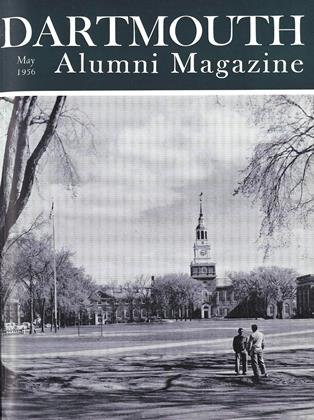ALTHOUGH the Dartmouth Rowing Club wasn't quite able to bring back the Thames Challenge Cup from the Henley Regatta in England last June, the Club did manage to lure away from England a rowing enthusiast and expert at fixing shells - one Albert Povey.
Albie, as he is known to Rowing Club members, recalls vividly how he came to make the transatlantic hop from his native Reading, England to Hanover, New Hampshire.
"I'd come down from Reading to watch the Henley and was helping out a bit with the Reading University shells," Povey said. "The Dartmouth eight-oared shell had just been landed with five splits in it from careless handling. I patched it up a bit so the M.I.T. crew could use it, and when they were finished a couple of friends and myself went to work and fixed it up for the Dartmouth crew. Later on Pep Perry (Hartwell Perry '55, president of the Rowing Club) came up and asked if I'd like to come to America and work on the Dartmouth shells. Well, I'd often thought about coming over, but never had the money. This seemed like a good way, so when all arrangements were made I came over last January, and here I am."
Even as he was talking Povey's hands were busy smoothing and shaping a thin, wooden strip of "beading" used to keep the bow decking of a shell in place. He had brought his kit of tools with him from England and paused occasionally to reach for another tool or check a measurement.
"There's an awful lot of repair work to be done on these shells," he explained a bit apologetically. "Some of them are pretty old and beat up and the students don't seem to have the time or know how to fix them right. Look at this," he pointed to a shell with a gaping hole in the bow. "They've been stuffing paper in this hole and rowing it all over the river."
In addition to taking care of Dartmouth's eight shells and other equipment, Povey also coachs the lightweight crews. Since his arrival last January he's had a busy schedule of repair work and coaching and frequently spends his evenings working on the shells.
Povey, who is 31, came by his skills at rowing and shell-rigging quite naturally. He became a construction worker at an early age and his dexterity with tools stood him in good stead when he joined the Reading Rowing Club in 194.1.
"We all had to pitch in to repair the Club's shells, and over the years I learned a lot about shells and how to care for them. Then after the war I coached and helped out with the University of Reading Rowing Club."
During the war Povey served in the British Navy and at one time was stationed on an American lend-lease destroyer. He still carries himself like a British sailor, appearing taller than his 5'9" height, and one senses his wiry strength in his handclasp and the quick way he moves about when working.
Povey is also a close student of rowing, having watched every Henley Regatta since 1946 and several European championships as well. "The United States has the best crews I've seen," admits Povey, "but they're going to have to be just as fast if not faster than they were in 1948 and 1952 if they're going to win the Olympic Races again this year."
"America has nothing to learn from the Russians in technique," Povey said, "but you could learn something from them in physical condition and training."
As for the Dartmouth crews, Povey thinks they're coming along just fine. "This is the big year for the Club," he says, "but I think we'll do all right. Perhaps," he adds in his quiet way, "a bit more discipline and more attention to training would help."
Having been here less than four months, Albie Povey does not feel that he knows a great deal about the United States. "But I do enjoy it here very much," he points out, "and I like the friendly spirit at Dartmouth." This summer he plans a trip to California with some Dartmouth students, and will then have a better chance to see this country.
"One thing, though, I don't like your winters. Look at that river out there. Still frozen over in April. It'll be another two weeks before we can get out on this stretch. Nothing like this in England."
Albert Povey
 View Full Issue
View Full Issue
More From This Issue
-
 Feature
FeatureD C U
May 1956 By GEORGE H. KALBFLEISCH, -
 Feature
FeatureOliver Wendell Holmes Slept – and Taught – Here
May 1956 By ROBERT S. BLUM '55 -
 Feature
FeatureNEW YORK ALUMNI AWARDS
May 1956 -
 Class Notes
Class Notes1918
May 1956 By ERNEST H. EARLEY, RICHARD A. HOLTON -
 Class Notes
Class Notes1923
May 1956 By CHESLEY T. BIXBY, THEODORE D. SHAPLEIGH -
 Class Notes
Class Notes1926
May 1956 By HERBERT H. HARWOOD, ANDREW J. O'CONNOR, RICHARD EBERHART '26
CLIFF JORDAN '45
-
 Sports
SportsWinter Sports
April 1953 By Cliff Jordan '45 -
 Article
ArticleGreen Jottings
July 1954 By CLIFF JORDAN '45 -
 Article
ArticleWith Big Green Teams
May 1955 By Cliff Jordan '45 -
 Article
ArticleGreen Jottings
November 1955 By CLIFF JORDAN '45 -
 Article
ArticleSwimming
January 1958 By CLIFF JORDAN '45 -
 Article
ArticleBaseball
May 1960 By CLIFF JORDAN '45
Article
-
 Article
ArticleDARTMOUTH AMBULANCE DECORATED
August 1917 -
 Article
ArticleDARTMOUTH ENSIGNS
February 1918 -
 Article
ArticleVeterans Entertained
February 1945 -
 Article
ArticleHarvard 17, Dartmouth 13
DECEMBER 1963 By DAVE ORR '57 -
 Article
ArticleFreshman Eligibility Affects Hockey Slate
DECEMBER 1971 By J.D. -
 Article
ArticleGreen Skiers Capture National College Title
May 1950 By Roger Gaylord '50.

